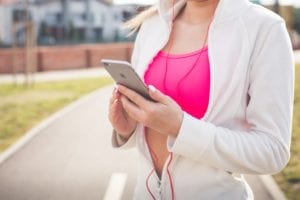Written by Taylor Woosley, Staff Writer. A 2-week intervention of college students reducing social media usage to 30-minutes a day resulted in significant reductions in feelings of anxiety (p < .001) and depression (p < .001) compared to the control.
 Social media (SM) has transformed the ways in which people interact with one another, sparking debate around its potential impact on peoples’ socioemotional well-being and mental health1. SM can be broadly defined as any digital tool, including social networking sites or applications, that allow for social interaction2. In the United States, around 70% of young people use social media multiple times per day, up from a third of youth in 20123. Moreover, the number of social media users worldwide in 2019 was 3.484 billion, with a 9% increase year-to-year4.
Social media (SM) has transformed the ways in which people interact with one another, sparking debate around its potential impact on peoples’ socioemotional well-being and mental health1. SM can be broadly defined as any digital tool, including social networking sites or applications, that allow for social interaction2. In the United States, around 70% of young people use social media multiple times per day, up from a third of youth in 20123. Moreover, the number of social media users worldwide in 2019 was 3.484 billion, with a 9% increase year-to-year4.
Concerns have arisen around the effects of SM on mental health, due to social media’s association with decreased face-to-face interpersonal interactions, addiction-like behaviors, and social pressure through increased social comparisons5. Accumulating evidence indicates that prolonged social media use may be associated with symptoms of stress, depression, and anxiety6.
Faulhaber et al. conducted a between-subjects designed longitudinal study to analyze the effect of self-monitoring limiting social media usage on six dimensions of psychological well-being. Subject inclusion consisted of being a college student enrolled at a university for the summer and fall semesters of 2021, who were over the age of 18, and used at least one social media application with their own smartphone. 230 subjects participated and were divided into either the treatment group (n=99) or the control group (n=131). Mean age was 22 years (SD = 5.2, range: 18-52), and 73% were female.
Participants demographic information was obtained via a questionnaire. Subjects were asked to pick their top three used social media platforms and report the time spent on social media in minutes at the pretest, along with screenshots of usage time. Psychological well-being was assessed using a variety of validated scales including the Spielberger State-Trait Anxiety Inventory questionnaire before and after the intervention. Depression was assessed using The Center for Epidemiologic Studies Depression Scale and loneliness was measured using the University of California, Los Angeles Loneliness Scale.
Subjects in the self-monitoring group were instructed to use social media for 30 minutes a day for the next 2 weeks. After the 2-week period, all subjects completed a post-treatment survey. Pre-treatment scores indicated that the majority of participants experienced moderate to high levels of anxiety, depression, and loneliness. No significant between-group differences were noted pre-treatment. Findings after the 2-week intervention show that self-monitoring social media usage to 30 minutes a day significantly lowered anxiety (p < .001), reduced depression (p < .001), and improved psychological well-being and positive affect (p < .05) compared to the control group.
Results of the study show that limiting social media usage significantly improved the psychological well-being of subjects in college, with significantly lower feelings of depression and anxiety. Further research should focus on investigating the effects of specific types of content on participants’ well-being with larger sample sizes and longer study lengths.
Source: Faulhaber, Manuela Ellen, Jeong Eun Lee, PubPub Team, and Douglas A. Gentile. “The effect of self-monitoring limited social media use on psychological well-being.” (2023).
© 2023 The Author(s)
Click here to read the full text study.
Posted July 17, 2023.
Taylor Woosley studied biology at Purdue University before becoming a 2016 graduate of Columbia College Chicago with a major in Writing. She currently resides in Glen Ellyn, IL.
References:
- Hamilton JL, Nesi J, Choukas-Bradley S. Reexamining Social Media and Socioemotional Well-Being Among Adolescents Through the Lens of the COVID-19 Pandemic: A Theoretical Review and Directions for Future Research. Perspect Psychol Sci. May 2022;17(3):662-679. doi:10.1177/17456916211014189
- Nesi J, Burke TA, Bettis AH, et al. Social media use and self-injurious thoughts and behaviors: A systematic review and meta-analysis. Clin Psychol Rev. Jul 2021;87:102038. doi:10.1016/j.cpr.2021.102038
- Abi-Jaoude E, Naylor KT, Pignatiello A. Smartphones, social media use and youth mental health. CMAJ : Canadian Medical Association journal = journal de l’Association medicale canadienne. Feb 10 2020;192(6):E136-e141. doi:10.1503/cmaj.190434
- Karim F, Oyewande AA, Abdalla LF, Chaudhry Ehsanullah R, Khan S. Social Media Use and Its Connection to Mental Health: A Systematic Review. Cureus. Jun 15 2020;12(6):e8627. doi:10.7759/cureus.8627
- Vidal C, Lhaksampa T, Miller L, Platt R. Social media use and depression in adolescents: a scoping review. Int Rev Psychiatry. May 2020;32(3):235-253. doi:10.1080/09540261.2020.1720623
- Kross E, Verduyn P, Sheppes G, Costello CK, Jonides J, Ybarra O. Social Media and Well-Being: Pitfalls, Progress, and Next Steps. Trends Cogn Sci. Jan 2021;25(1):55-66. doi:10.1016/j.tics.2020.10.005
